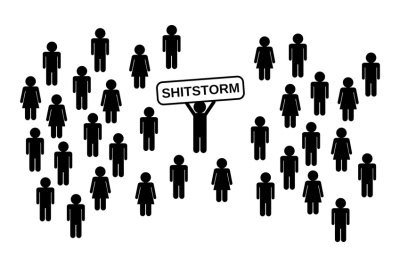A PR “shitstorm” is a brand’s worst nightmare, but they happen to even the best and most reputable businesses. How a brand handles the storm makes all the difference in the world. Being prepared and knowing how to handle a “shitstorm” will ensure that you come out smelling like roses on the other side.
As more and more brands increasing their presence on Facebook, Twitter, Instagram and other social media sites, crises are not only bound to happen, but they’re pretty much expected to. In fact, they are happening so often that the term “shitstorm” is now being used to describe these crises, and it’s a term that is used quite often in the PR world. Why? Because when a crisis strikes on social media, it can spread like wildfire and turn into a brutal assault.
The term “shitstorm” might sound harsh, but that’s because social media crises are, in fact, harsh. However, when a storm like this strikes, preparing for it and knowing how to handle it will ensure that you are able to manage it.
Here’s a look at how to get through a PR shitstorm so that you come out on the other side smelling like roses.
Before the Storm Strikes
In this day and age, it isn’t a matter of if a crisis is going to strike; it’s a matter of when. Though social media offers a lot of positive for business owners, there are also some negatives. The biggest disadvantage of promoting a brand on social media is should something go awry, the world will know in no time, and often before you do! For example, if a customer is unhappy with a product that they received or believes that the service a company offered was less than stellar, they can easily make their complaint known on social media, and that complaint can be shared over and over and over again. What does that mean for your business? – Well, let’s just say that the results are less than optimal.
But, the effects of a crisis don’t have to be so disastrous. If you’re prepared in advance, it will be a whole lot easier to navigate through the shitstorm. How do you prepare for a crisis ahead of time? Here are some tips to keep in mind:
- Always make sure that listen and that you are aware. Stay active and up-to-date with all of your social media channels. Make sure that you closely follow everything that is being posted. Pay attention to any red flags that indicate a shitstorm is brewing.
- Have a plan of action ready ahead of time. Should a crisis strike, you will be able to be proactive and act quickly to reduce the damaging effects to your reputation and your business.
- If you plan on outsourcing your social media marketing, make sure that you choose a company with an excellent reputation, and one that knows how to develop a crisis response plan and put it into action.

Find more statistics at Statista
In the Midst of the Storm
Whether you see a crisis is about to unfold, or it has already reared its ugly head, acting quickly is essential. If you don’t react, the damage is going to be way worse and has the potential to destroy what you have worked so hard to build.
Here are some helpful tips to keep in mind when you are in the midst of a shitstorm:
- Respond quickly. As soon as you notice that an issue is about to arise or has already arisen, make sure that you take swift action. The quicker you react, the better your chances of keeping the crisis under control will be. For example, if you see a negative comment posted on one of your social media channels, make sure that you react to it as soon as you possibly can.
- Take blame. Even the most reputable, trustworthy brands make mistakes. It happens. When a crisis erupts, don’t pass the buck and blame it on someone else. Instead, take full responsibility for the issue. The public will see that you are human and that you are aware that there is an issue. Laying the blame on someone or something else can destroy the public’s faith in you and make you seem, to put it mildly, like a chump.
- Offer your apologies. In addition to taking the blame, you should also extend your sincere apologies. You want the public to know that you are just as upset as they are. Saying you’re sorry proves that you are taking ownership of the problem.
- Assure the public. You want to let the public know that you are working on resolving the issue. Even if you aren’t sure of the solution, you still want to let people know that you are working on finding one that will make everyone happy.
The End of the Storm
Once you have successfully averted the crisis, restart the process. Don’t think that just because you have managed to get through one crisis and come out on the other side that you are automatically prepared for the next one that comes your way.
Remain diligent with your monitoring efforts. Stay active and aware of all of your social media channels. Make sure that you know what is going on at all times. Pay attention to the signs that indicate a crisis is looming. Also, it’s important to constantly evolve your crisis management strategies. Was there anything you could have done differently with the last crisis? Is there something that you could do better with any future crises? Integrate anything that you have learned from your past experiences with your current and future crisis management plans.
